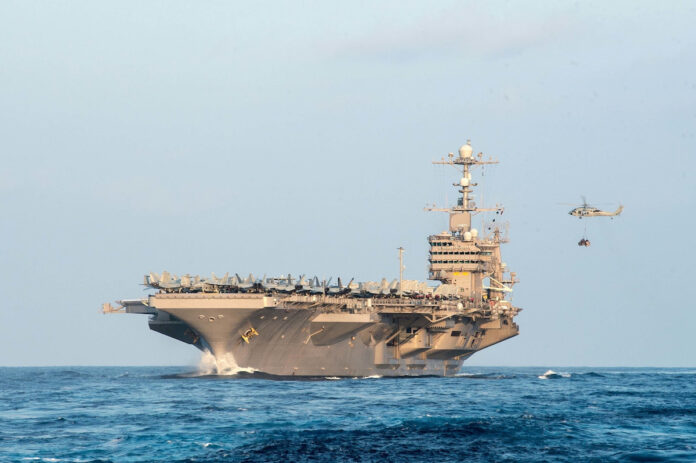The Asian giant is fighting on two aspects: the internal economic one, that is the reduction of Western investments; the military one in the Taiwan Strait.
The West flexes its muscles in Beijing by navigating more and more warships in the Indo Pacific region. In addition to the stars and stripes aircraft carriers, an entire British flotilla and units of the French navy pass through the Taiwan Strait, while President Joe Biden invites the leaders of Japan, India and Australia to Washington. These are the most important countries which feel threatened in the Far East by the aggression of the Dragon.
How to corner Beijing without firing a shot
It is difficult to think that all this leads to a real military confrontation, which would have neither winners nor losers. Instead, one can guess the strategy that justifies this deployment of forces. When in 1983 President Ronald Reagan decided to bring the former Soviet Union to its knees, he launched the Space Shield plan which would have ensured the United States clear military superiority. Moscow, already struggling with internal problems, could never economically support an adequate military countermove and the crisis of its empire began.
A real arms race could be lethal for China
Something similar seems to emerge in the relations between the West and China. The great Asian country hides economic weaknesses that undermine its stability. Having based its double-digit annual growth on Western investment, Beijing now faces the prospect – albeit in the long term – of having to give it up. Decoupling will be a slow process, but it has begun, and the web giants have already barred China from future investments. Ghost towns, the construction of which drove around 15% of economic growth for a decade, are a long-term investment, but for the moment they are staggering the country’s finances.
The arms industry can only celebrate the new course of world politics
A massive and lasting military effort would risk jeopardizing the results achieved. No one would believe anymore in shared prosperity, promised more and more frequently by Beijing’s leaders to millions of Chinese. On the other hand, with the end of the conflict in Afghanistan, the very powerful American military industrial apparatus draws considerable profits from the situation. Large quantities of weapons have been and will be sold to countries in the area. The European Union appears to be increasingly dominated by the Brussels hawks and sees its pacifist creed being questioned.
Nell’ Indo-Pacifico l’Occidente mostra i muscoli a Pechino
Il gigante asiatico si trova a combattere su due piani. Quello economico interno, cioè la riduzione degli investimenti occidentali, e quello militare nello stretto di Taiwan.
L’Occidente mostra i muscoli a Pechino facendo navigare nell’Indo Pacifico un numero sempre maggiore di navi da guerra. Oltre alle portaerei a stelle e strisce, transitano nello Stretto di Taiwan un’intera flottiglia inglese e unità della marina militare francese, mentre il Presidente Joe Biden invita a Washington i leader di Giappone, India e Australia. Si tratta dei Paesi di maggior peso minacciati in Estremo Oriente dall’aggressività del Dragone.
Come mettere alle strette Pechino senza sparare un colpo
Difficile pensare che tutto ciò conduca verso uno scontro militare vero e proprio, che non avrebbe né vinti né vincitori. Si può invece intuire la strategia che giustifica questo spiegamento di forze. Quando nel 1983 il presidente Ronald Reagan decise di mettere in ginocchio l’allora Unione Sovietica, varò il piano Scudo Spaziale che avrebbe assicurato agli Usa una netta superiorità militare. Mosca, già alle prese con problemi interni, non avrebbe mai potuto sostenere economicamente una contromossa militare adeguata ed ebbe inizio la crisi del suo impero.
Una vera corsa agli armamenti potrebbe essere letale per la Cina
Qualcosa di simile sembra profilarsi nei rapporti fra l’Occidente e la Cina. Il grande Paese asiatico nasconde debolezze economiche che ne minano la stabilità. Avendo fondato il suo sviluppo annuale a due cifre sugli investimenti occidentali, Pechino si trova ora di fronte alla prospettiva – sia pure a lungo termine – di dovervi rinunciare. Il disaccoppiamento sarà un processo lento, ma è iniziato e i colossi del Web hanno già escluso la Cina da futuri investimenti. Le città fantasma, la cui costruzione ha trainato per un decennio circa il 15% della crescita economica, costituiscono un investimento a lungo termine, ma per il momento fanno barcollare le finanze del Paese.
L’industria delle armi non può che festeggiare il nuovo corso della politica mondiale
Un massiccio e duraturo sforzo militare rischierebbe di compromettere i risultati raggiunti. Nessuno crederebbe più alla prosperità condivisa, promessa sempre più di frequente dai leader di Pechino a milioni di cinesi. Sull’altro fronte, chiuso il conflitto in Afghanistan, il potentissimo apparato industriale militare americano trae notevoli profitti dalla situazione. Grandi quantitativi di armi sono stati e saranno venduti ai Paesi dell’area. L’Unione Europea sembra essere sempre più dominata dai falchi di Bruxelles e vede messo in discussione il suo credo pacifista.








